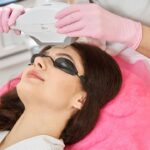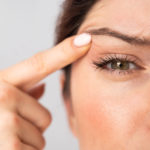At Michigan Oculofacial Specialists, we diagnose and treat blepharospasm, a movement disorder affecting individuals across Michigan. Our team, led by Doctors William Ehrlich, Lawrence Handler and Zachary Pearce, uses the latest advancements to provide effective, life-improving treatments for eyelid spasms and related symptoms.
What is Blepharospasm?
Blepharospasm is a neurological condition marked by the uncontrollable tightening of eyelid muscles, resulting in repetitive blinking or spasms. It arises from irregularities in the basal ganglia, a set of brain structures responsible for movement regulation. In severe instances, blepharospasm can cause functional blindness as individuals struggle to keep their eyes open.
Causes and Symptoms of Blepharospasm
The causes of blepharospasm are complex, involving both genetic factors and environmental triggers. Understanding these causes and symptoms is crucial to finding the right treatment.
Causes:
- Genetic Factors: A family history of blepharospasm or related neurological disorders suggests a genetic component.
- Environmental Triggers: Exposure to bright light, dust, wind, or pollutants can initiate or worsen symptoms.
- Neurological Disorders: Conditions that affect the nervous system, including Parkinson’s disease (a disorder that impacts movement), Meige syndrome (characterized by involuntary blinking and jaw movement), and tardive dyskinesia (involuntary movements caused by long-term medication use), are closely linked with blepharospasm.
- Basal Ganglia Dysfunction: The basal ganglia, crucial for controlling movements, may malfunction, leading to involuntary spasms.
- Facial Nerve Irritation: The facial nerve’s irritation can lead to hemifacial spasm, affecting one side of the face, which is often associated with blepharospasm.
Symptoms:
- Involuntary Blinking or Eyelid Twitching: The hallmark of blepharospasm, these spasms can range from mild to severe.
- Increased Blinking in Bright Light: Sensitivity to light can significantly trigger symptoms.
- Eye Irritation and Dryness: Feelings of grittiness (dry eye) or discomfort in the eyes often accompany the spasms.
- Difficulty Keeping Eyes Open: In severe cases, patients may experience functional blindness due to the inability to open their eyes.
Ideal Candidates for Blepharospasm Treatment
Identifying the right candidates for blepharospasm treatment ensures that those most likely to benefit from intervention receive the appropriate care. Ideal candidates often include individuals who:
- Experience Significant Impact: Those whose daily activities are considerably affected by involuntary muscle contractions of the eyes.
- Diagnosed Conditions: Patients officially diagnosed with benign essential blepharospasm (BEB), showcasing repeated eyelid spasms without an identifiable external cause.
- Meige Syndrome: Individuals suffering from this syndrome experience not only eyelid spasms but also involuntary movements of the jaw or tongue.
- Functional Blindness: Patients who face significant challenges in keeping their eyes open, leading to a state of functional blindness, can see substantial improvements.
- Responsive to Previous Treatments: Those who have shown positive responses to earlier forms of therapy may also be good candidates for more advanced treatments. These candidates are typically those who have not found relief through conventional treatments or require a more targeted approach to manage their symptoms effectively.
Botox for Blepharospasm
Botox® injections stand at the forefront of treatments for blepharospasm, providing a highly effective solution for those affected by this condition. This therapeutic strategy is characterized by:
- Targeted Injections: The injection of botulinum toxin is carefully administered directly into the eyelid muscles, specifically targeting the orbicularis oculi muscle, which is often responsible for the spasms.
- Muscle Relaxation: By introducing botulinum toxin into these muscles, the treatment effectively relaxes them. This action helps in reducing or altogether eliminating the involuntary muscle contractions and abnormal movements associated with blepharospasm.
- Symptom Relief: The majority of patients experience substantial relief from the discomfort and visual disturbances triggered by blepharospasm. This improvement significantly enhances their quality of life, allowing for better daily functioning and increased comfort.
- Procedure Details: Botox injections are minimally invasive and are typically administered in an outpatient setting. The procedure is quick, allowing patients to complete their visit in a short duration without the need for a prolonged recovery period.
- Duration of Effectiveness: The effects of Botox for blepharospasm vary among individuals but generally last several months. To sustain the treatment’s benefits, patients may require repeat injections at intervals determined by their response to the therapy.
By targeting the eyelid muscles with precision, Botox injections provide a safe and effective method for alleviating the symptoms of blepharospasm. It’s important to note, this treatment is not designed to treat Parkinson’s disease, but rather to address the specific symptom of involuntary eyelid movements.
The results are amazing!
Dr. Pearce was recommended by a friend who had eyelid surgery for droop, which I needed also. From the first appointment, he spent plenty of time with me explaining and answering all my questions (even by phone and email as surgery neared). The results are amazing! Scar lines are clean and fading quickly (7 weeks post-surgery now), peripheral vision better and so much more light! The bonus is a much younger look. Highly recommend Dr. Pearce and the team at his surgery center also.
Recovery
Patients typically observe noticeable improvements within a few days after their Botox treatment, achieving the full spectrum of benefits within two weeks. The relief provided by Botox in reducing muscle contractions and eye irritation—key aspects of how blepharospasm affects individuals—can last for several months. As the efficacy of Botox diminishes over time, subsequent treatments may be necessary to sustain these improvements and effectively manage the ongoing effects of blepharospasm.
Cost
The cost of Botox treatment for blepharospasm can vary based on the extent of treatment necessary to provide relief from the neurologic disorder and its symptoms. Our clinic is committed to ensuring that every patient receives a personalized treatment plan tailored to their specific needs.
FAQs
While there is no definitive cure for blepharospasm, effective treatments can significantly reduce symptoms.
Early signs of blepharospasm include frequent blinking, eyelid twitching, and increased sensitivity to light. Individuals may also experience involuntary eyelid closure, discomfort, or a gritty sensation in the eyes.
Yes, the condition can lead to temporary vision impairment due to involuntary eyelid closure.
Triggers may include stress, fatigue, bright lights, and eye strain.
Blepharospasm is relatively uncommon, but it affects individuals of all ages, more frequently in middle-aged and older adults.
Contact Us
If you or someone you care about is dealing with blepharospasm and looking for treatment in Michigan, the experts at Michigan Oculofacial Specialists are here to help. Contact us today to learn how we can support you in managing blepharospasm, improving your eye health, and enhancing your overall well-being.



